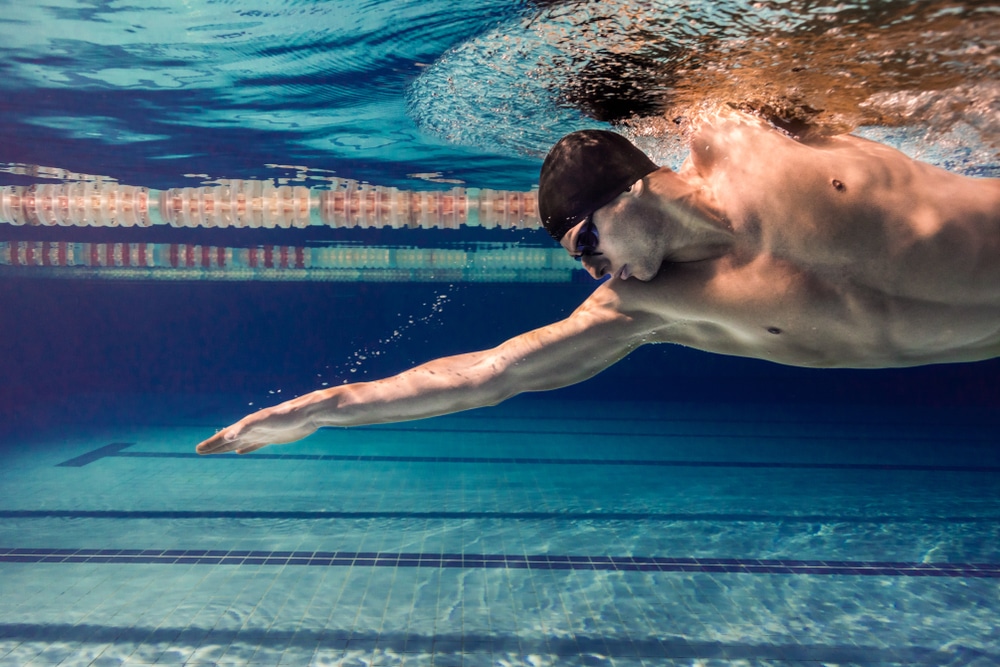Potential Harms Of Opening Your Eyes Underwater While Swimming
For many adults, the thought of wearing swim goggles can feel a bit awkward, especially when peers seem effortlessly comfortable opening their eyes underwater without them. Hastily fitting a pair of goggles on, only to end up with a snapped band or aggressively pressed eyecups, isn’t the most graceful of looks.
However, it’s worth reconsidering the use of goggles, even if yours are gathering dust in the back of your closet amidst your old high school keepsakes.
You might not feel any discomfort immediately after opening your eyes underwater, but this doesn’t guarantee that your eyes are safe from potential harm. “There is no body of water that’s completely safe for you to open your eyes in without the risk of experiencing irritation, infection, or redness,” states Danielle Richardson, OD, an optometrist based in Los Angeles, California.
Regardless of past habits of swimming without goggles from childhood, experts continue to emphasize their necessity for eye protection in water. Below, they discuss the hazards to your eyes and steps to take if you’ve exposed your eyes to water, particularly for contact lens wearers.
What Dangers Lurk When You Open Your Eyes Underwater?
Swimming in natural waters like lakes, rivers, or oceans unprotected is not recommended due to multiple risks. These include eye irritation, redness, dryness, and the possibility of blurry vision, points out Dr. Richardson. Bacteria, viruses, sewage, or debris in untreated water can cause infections such as pink eye (conjunctivitis).
Don’t be deceived by the apparent cleanliness or clarity of the water; dangers still exist. According to Diane Hilal-Campo, MD, an ophthalmologist from Oakland, New Jersey, and the founder of twenty/twenty beauty, even household tap water contains microorganisms, like Acanthamoeba, which can lead to serious eye infections like acanthamoeba keratitis, potentially causing permanent vision damage or blindness.
Due to its higher salt content, sea water can sting and irritate your eyes compared to your tears, explains Dr. Richardson. Additionally, small particles like sand can cause tiny scratches on your corneas.
Are chlorinated swimming pools safer? Not necessarily. Even with regular cleaning and disinfection, pools still pose a risk. The chlorine used for purification can irritate your eyes leading to redness. “There’s no guarantee with chlorine levels; they could be too high or too low,” Dr. Hilal-Campo remarks. “Even at perfect levels, the chemicals can irritate the delicate conjunctiva lining the eye, causing allergic reactions in some individuals.”
Symptoms such as swollen eyelids, burning sensations, and vision blurriness may occur even without apparent skin reactions. Plus, if a pool’s pH becomes more acidic due to contaminants like urine, your eyes can suffer even more.
Safe Underwater Swimming Techniques for Open Eyes
Both Dr. Richardson and Dr. Hilal-Campo stress the significance of wearing goggles to safely open your eyes underwater. “Wearing goggles is the sole method to open your eyes underwater without discomfort or risk,” insists Dr. Richardson. Nowadays, goggles are far more advanced, with ultraviolet protection and prescription lens options, adds Dr. Hilal-Campo.
If you don’t intend to get your face wet, you might manage without goggles. However, you must diligently avoid getting water splashed into your eyes and rinse them thoroughly if any water does get in, advises Dr. Richardson. (Details to follow!)
“There is no body of water that’s safe enough to open your eyes underwater without risk.” —Danielle Richardson, OD
What to Do If You Must Open Your Eyes Underwater Without Goggles
In situations where you need to see underwater without goggles perhaps to retrieve a dropped item at the bottom of a lake, try to limit the exposure time. Dr. Richardson makes this recommendation to her surfer clients and those engaging in water sports.
If your eyes do come in contact with water, Dr. Richardson suggests using preservative-free lubricant eye drops available at pharmacies to flush them out. “It’s crucial to use these drops after exposure to rehydrate the eyes and remove any foreign particles,” she explains.
Dr. Hilal-Campo recommends using the lubricant eye drops every hour for about six hours. Eye irritation typically resolves after this treatment as noted by Dr. Richardson. However, if problems persist post-treatment, an eye doctor’s consultation is warranted. Contact lens wearers should seek prompt attention from an eye specialist if any discomfort arises after water exposure.
In case lubricant eye drops are unavailable, it’s not advisable to just rinse your eyes with any water, due to potential bacterial content. “Only use solutions specifically designed for the eye to reduce the risk of infections,” Dr. Richardson emphasizes.
Considerations for Contact Lens Users
Those who wear contact lenses face a greater risk of eye infections, says Dr. Hilal-Campo. “The lenses can alter the eye’s surface and everyday use exacerbates their sensitivity to infections.” Furthermore, lenses can accumulate bacteria or chlorine, or they might get dislodged.
If you plan to engage in any water-related activities with contacts on, opt for daily disposables and toss them out right after your aquatic adventures, even if you’ve worn goggles throughout. And should you notice redness or irritation, consult an eye doctor as soon as possible, Dr. Richardson recommends.
Final Thoughts
There isn’t a single water environment that’s completely risk-free for open-eye swimming, no matter how pristine it appears. Disinfected waters can still threaten your eyes due to chemical treatments. So, it’s time to recover those long-forgotten goggles, commit to using them, and only then dive into the water with confidence.















